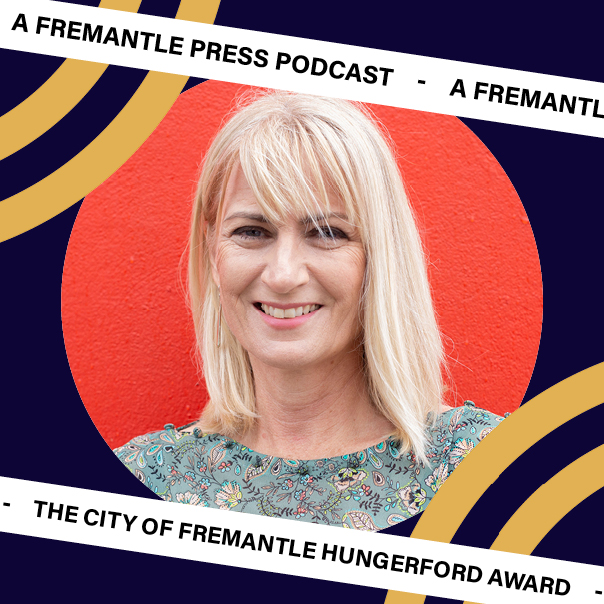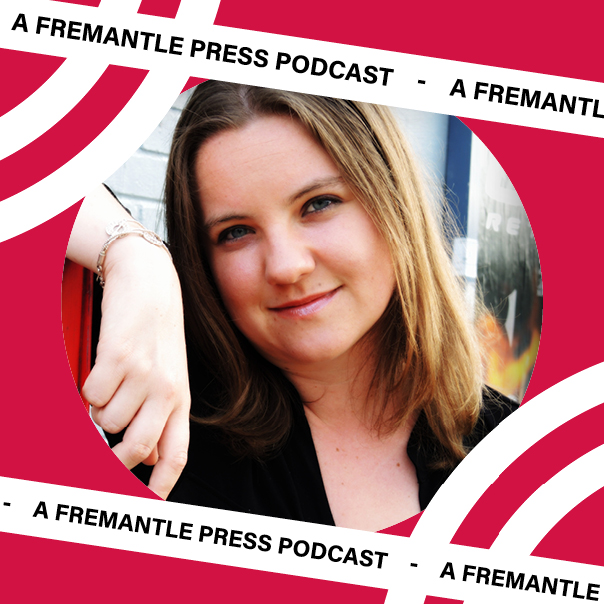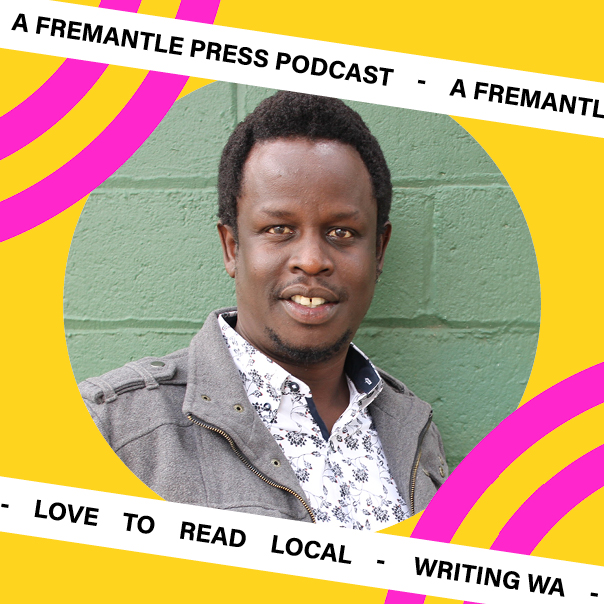Episode Transcript
[00:00:10] Speaker A: Hello and welcome to the Fogarty Literary Award podcast. Today we are recording Awal Yalep in Whadjuk Nyungar Buja. And I'd like to acknowledge our first storytellers along with Noongar elders past and present.
My name is Kathryn Alam. In 2023, I won the Fogarty Literary Award for my novel, the Skeleton House.
The Fogarty Literary Award is proudly sponsored by the Fogarty Foundation, Fremantle Press and the Centre for Stories. The winner receives a publishing contract with Fremantle Press, a $20,000 cash prize, a residency with the center for Stories, along with a stipend of $1,500.
These opportunities are vital to support our local literary talent. Two years ago, I submitted my manuscript with a very small hope, and being shortlisted was such a boost of confidence and validation of my invisible hard work.
Today's guest is Serena Moss, whose manuscript is called Wreckage.
But first, I'm here with Georgia Richter, publisher at Fremantle Press. Georgia, describe why you chose this manuscript.
[00:01:19] Speaker B: Oh, I've got to say that reading this manuscript was like watching a car crash, both literally and figuratively. By this I mean that you can't look away and you don't even want to, even as the narrator, Carter Reynolds, kills his best mate in a car crash on the very first page.
Serena Moss has got a really unique writing style, and it often felt to me as if I was reading a verse novel because her prose and her sentences are so sparse.
So Wreckage is a novel about stripping things back to the bare bones, surviving a car crash, finding meaning through fixing broken cars or other ways to make things fit for purpose, because the humans who need them require a new way of getting by in the world.
And I think that in this stylistic choice, Serena's delivery complements her themes tremendously.
I think this novel will resonate with young adult readers in particular, because it's about that fierce belief in their own immortality that makes young people take such risks. And I think it's also going to speak to people who live in small communities and country towns and people who know the real stories behind road toll statistics.
So this novel is fast moving, thought provoking, but ultimately it's hopeful, too, because it offers a way forward or another way of thinking about cataclysmic loss.
[00:02:38] Speaker A: A lot of those themes really resonate with me. Skeleton House was also set in a small regional town, and that sounds amazing.
All right, well, now let's hear from Serena herself.
Serena Moss spent her childhood between Perth and a string of small Western Australian towns and now lives in Waughrakhine Wa, just northeast Of Geraldton.
Her work explores the intersections of grief, disability and small town legacy.
Serena writes from sheds, servo cafes and the in the backseat of her nan's car while waiting for her between medical appointments.
She believes in messy boys, wild girls, and fiction that starts after the worst thing has already happened. Wreckage is her debut novel.
Congratulations on getting this far.
What is it like to know that you have a one in four chance of having your manuscript become a published book?
[00:03:35] Speaker C: Honestly, it still doesn't feel real. Like I keep waiting for someone to tap me on the shoulder and say, sorry, love, we meant someone else. Like I have dreamed of being published since I was a kid. But that dream felt like again, it belonged to someone else. Someone with an agent, a writing degree, a festival tote bag in a favorite cafe in Carlisle. Someone like me. Someone who wrote scenes together in survey cafe or in, you know, in sheds, who wrote dialogue on the back of these receipts in hospital waiting rooms. So to have a shot like a real 1 in 4 shot at seeing wreckage become a book, it's wild. It's terrifying, it's beautiful. For someone to pick up this raw, unfiltered manuscript and say, I see this, I feel this. I'm just flawed, humbled, completely undone. And I think I was a stun mullet when Claire and Georgia caught and I was like, I don't even know if I managed a full sentence. I think I just made a noise and I like, ran to the nearest meeting room at work. I thought it was a prank, but it wasn't. So the story landed and it's reached someone. And it means it's mattered to someone more than just me. And for a girl from Jaro, that just. That's everything. But mostly it's proof this story matters.
[00:04:53] Speaker A: Yes, it does, actually. Leads me, I'd love to hear about you telling us about your manuscript in your own words.
[00:05:00] Speaker C: What.
[00:05:01] Speaker A: What is your manuscript about? What's the story?
[00:05:03] Speaker C: Okay, so at its core, Wreckage is about aftermath, what's left when the worst possible thing has happened and you're the one still breathing. It follows Carter Reynolds. So he's this small town golden boy who drink drives his best mate Jason into a tree and he wakes up with no best mate, no legs, and this town that doesn't know what to do with him. So Jason's gone, Carter's not. And that's a problem.
It's set in Kulin, which is this tiny weep out town. It's about three hours southeast of Perth and it's home to this tin horse highway, a Burning Man Festival. And this, like, water slide that's bigger than the postcode. It's like 182 meters. Ridiculous, but we move through a scatter of small towns like this, places with names that no one outside wa can pronounce. You know, small towns that are hard to find and even harder to leave. And they're impossible to forget.
It's written in first person where you're inside Carter's head. We're feeling the panic, the silence, the guilt, the won't stop scratching in his ribs. And alongside him, there's this chorus of people trying to keep their own pieces from sliding. There's this girl that stays even when everyone else leaves, and a dad who's better at fixing cars and feelings. And a best mate that didn't get to grow up. So it's really a coming of grief story, a coming of guilt and age story. And it's a what do you do now that you've survived its story? And it's about consequences. What happens when you're the one that stays behind in the wreck, in your town, in your skin. It's about what you build from the wreckage and who you choose to become after.
[00:06:35] Speaker A: Wow, I love that phrase. Coming of grief that I don't think I've heard that before. That just made me stop and think. It's a beautiful way of putting.
Sounds like a lot happening, right? Really eccentric cast of characters. When you're ready, would you please share a reading from the wreckage?
[00:06:53] Speaker C: So, just for context, Eva is a car. So she is a 2008 Holden VSS.
She's nothing fancy, but to Carter and Jason, she became everything.
The night we won, Eva screamed like she had something to prove. I threw her sideways into every corner like I was dancing with the devil and leading. That last lap was mine. And when we crossed the line, when I yanked the handbrake and kicked half the outfield into orbit, the announcer cracked his throat on my name like it owed him something. Carter fucking Reynolds, the pride of Foolin. The crowd roared raucous, unfiltered country. Loud noise like gravel in the lungs, like diesel in the blood. Fireworks from a U tray. Beers raised like hallelujahs. Jason yanked me out of the car, struck the trophy into my arms and hugged me like he wanted to break something. His fingers dug into my back. My ribs ached. He was laughing or maybe shouting, or maybe both. You absolute sick bastard. I winced. You're welcome. Also, you cried a little. He pulled back just far enough to flip me off, his grin wide enough to split his face.
We turned toward the crowd, arms slung over each other's shoulders like we'd conquered something and maybe we had. The track, the year, the doubt, all of it. Jason held the trophy over his head. I could feel the tremble in his arm, whether from adrenaline or disbelief, I didn't know. Taylor climbed onto Briggsy's back. Mick tried to climb the chain link fence.
Nash yelled something unintelligible from the Ute trait. The air smelled like rubber and fuel and sunbaked grass and the sharp, sweet burn of someone lining up behind the sponsor tent. It smelled like victory, like youth at its most dangerous. I looked at Jason. His eyes were lit up with something nuclear. Not just happiness, something bigger, something wild. The kind of joy that makes you think this moment is the only one that's real.
Three years, he said, voice raw. Three bloody years we've been trying to win this thing. We did it. I say no, you did it that last lap, mate. You are possessed by the ghost of Peter Brock in poor decision making.
He laughed loud, full body born from below the ribs kind of laugh, the kind that made other people smile without knowing why.
You realize we peaked tonight. Yeah, he said. It's all downhill from here.
We weren't brothers. We were worse. We were welded together by scraped knees, midnight dares, secret handshakes and a thousand fuck ups no one else ever saw. We bled on the same tools, broken the same bones, punched the same bullies, shared first smokes, first beers, first heartbreaks. He made me braver. I made him reckless. We built each other like we built Eva. Flawed and fast and wired to explode.
And for a moment, just that one stretch of dusk over red dirt. We were untouchable. We were kings.
No rules, no limits. Just the rush of having made something from scratch. Ourselves. That car, this win, and knowing that no one could take it from us. Not yet. We were invincible.
[00:10:15] Speaker A: Well done. Thank you for sharing. I can just feel the adrenaline of the moment, like I was feeling the hype.
And the bond between those two characters is so authentic.
Just. It really feels very real. I've only heard them for a few minutes, but I can feel that.
Do you think that young readers will recognize themselves in your novel Wreckage? What do you hope they might get out of it?
[00:10:43] Speaker C: I really hope so. Especially the ones that have messed up. Or they might feel like they have.
The ones that are still carrying the fallout. They're still showing up to school or work while everything inside them feels wrecked. The ones that are trying to hold it together when they're not okay at all. Like I hope. I hope they see themselves in the parts that usually get skipped. They sticky, shame, heavy aftermath, the parts that you can't talk about at parties. Silence, the weight, slow kind of survival.
I really think some might see themselves in Carter, others in Maggie or Robbo or maybe even Steve O.
But like, really. And I hope this is on point. I hope they walk away knowing this. That choices have consequences and even the ones you don't mean. That some things don't get fixed. And sometimes that the bravest thing you can do is stay in your town, in your body, in your story.
That grief isn't tidy and that guilt doesn't always fade. That you can make a terrible mistake and you can still find a way forward. Not a clean path, not a simple one, but real one. That you can still be wrecked and still be worthy of love, still be worth showing up for, still be worth someone worth becoming.
And that whatever happened to you, whatever the mistake or the moment or the thing that you wish you could undo, it doesn't get to define you. It doesn't get the final word, what ujunx does. And it's what you build from the wreckage. That's the story that matters.
[00:12:18] Speaker A: A lot of what you just spoke about are kind of universal human things that we have to go to that go through, you know, human life is messy. We have to make mistakes, deal with consequences of things outside of our control. And it makes it even stickier as an adolescent trying to go through that.
So I want to know what made you choose to write a YA novel? Or would you even define Wreckage as a YA novel?
[00:12:44] Speaker C: I didn't sit down and set out to write a YA like. Wreckage is a stitched together bunch of scenes from all sorts of things across my past. I wrote it again between bits and pieces, but there was this voice in my head, and it was Carter. And he wouldn't shut up and he wouldn't leave me alone. So when I first started writing it, I was writing about this country boy that had multiple sclerosis. And he was trying to do so in this town, and then it just evolved from there. And the more I was writing these characters and these stories and these towns, the bigger and bigger it got. So it went from being Carter having multiple sclerosis, this town rallying behind him, trying to, you know, adapt his house so he could get through and have the wheelchair access and everything to, okay, well, what happens if he drives the car and he does something? And what about the consequences of that? And how can we make this have a bit More of an impact and then might lean towards a bit more adults. We're trying to bring that back down to ya. But yeah, just the banter and the dialogue, the characters, they just built themselves. I wrote a few lines and they just went from there.
[00:13:43] Speaker A: That is the messy, beautiful process of storytelling. You know, that's how I write as well. I get this character and voice and then it takes over.
[00:13:51] Speaker C: I don't even know if I have a writing process like I thought it was so fragmented and feral.
[00:13:55] Speaker A: Yes, you do. That is a writing process, a feral writing process.
[00:13:59] Speaker C: Honestly, if there's a couple of things I can say, maybe not about the process, but about the whole thing. The best vanilla slice you're going to have is from the Shearing Shed Cafe in Northampton. They're cool. In this town that I set Wreckage in, It has this 182 meter water slide, that Burning man, and it's got this kind of town and a tin horse highway that makes you laugh out loud. That the Gingin Roadhouse, they've got a toasty that's honestly going to change your life.
And the Badgingar Roadhouse has peacocks, like actual literal peacocks. And a golf course behind the survey. So these small towns, the ones that shape this story and me and so many other people, are full of love and grit and that kind of stubborn kind of joy you don't get from anywhere else. But they need your tourism, they need your attention, your care. And that's why I set out to write Wreckage. And I want it to be based in Western Australia and I wanted it based in this small town and then it just spiraled from there. But, you know, rural communities make space for places like Wreckage and we need to keep making space for them too. But just a massive, massive thank you to the Foggy Foundation, Fremantle Press, the Center for Stories, for creating this space where this weird, grief, heavy rural novel could be seen, to see me for getting manuscript. I don't know what we call it. A chance to exist out loud.
Good luck to the other shortlisted writers. Like, I've heard there's some serious talent this year and I'm so humbled to be alongside you and I hope I get to meet you, we get to hug, we get to maybe even some of the listeners. I hope we get to, you know, collaborate and celebrate each other and just that I'm grateful from the bottom of my heart. Like, this is just so surreal, the whole. The process, the speed of it. Yeah, I'm just. I think, I'm so shocked.
[00:15:39] Speaker A: I think that's a very, very common experience.
Thank you so much for being here today and sharing more about your manuscript Wreckage.
Listeners, you can meet Serena moss at the 2025 Fogarty Literary Award announcement at Government House ballroom on Tuesday, 3rd of June. Tickets are free and available from the Fremantle Press website. Website. I'm Katherine Allum and I look forward to joining you on our next Fogarty podcast. Thank you.


